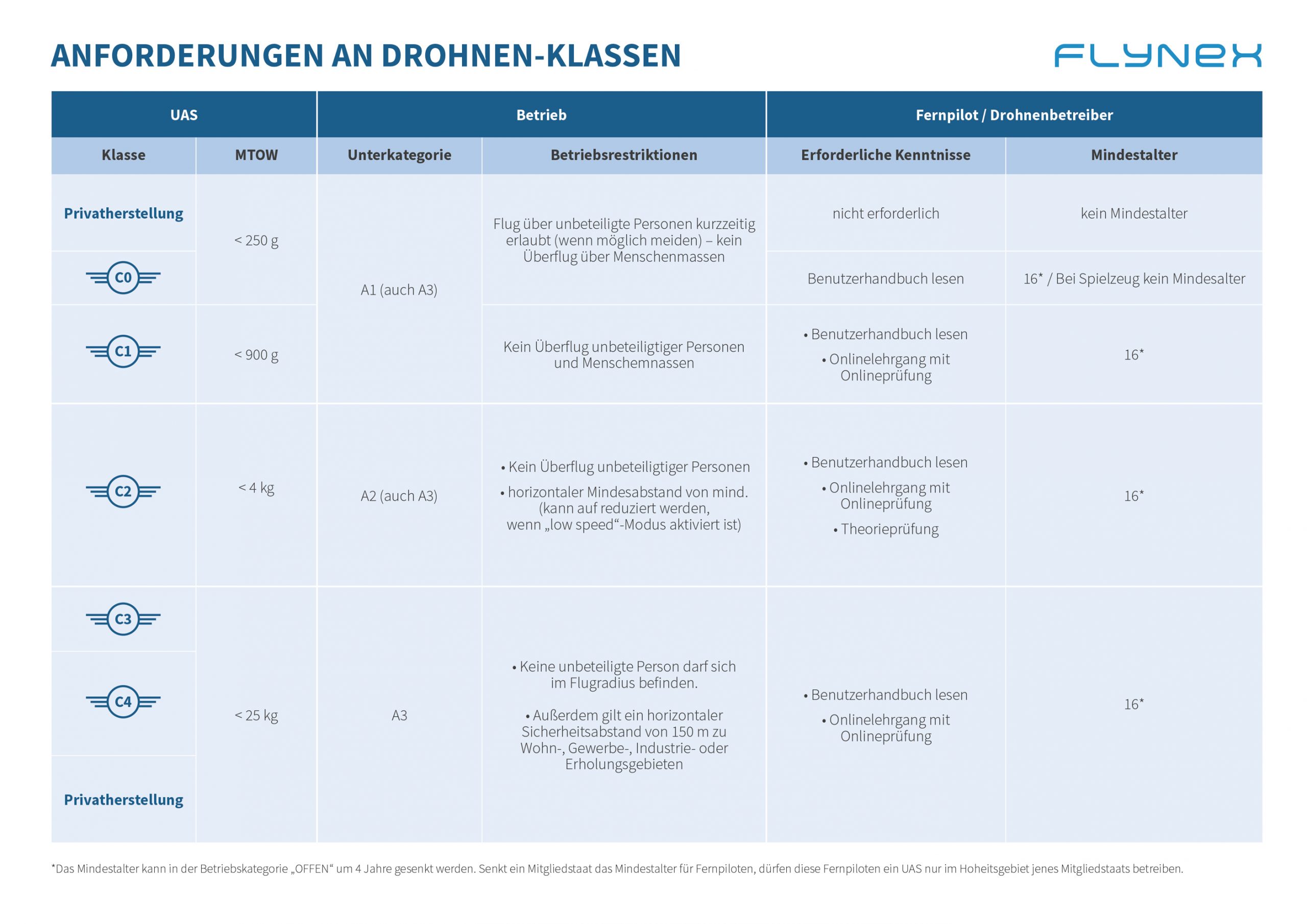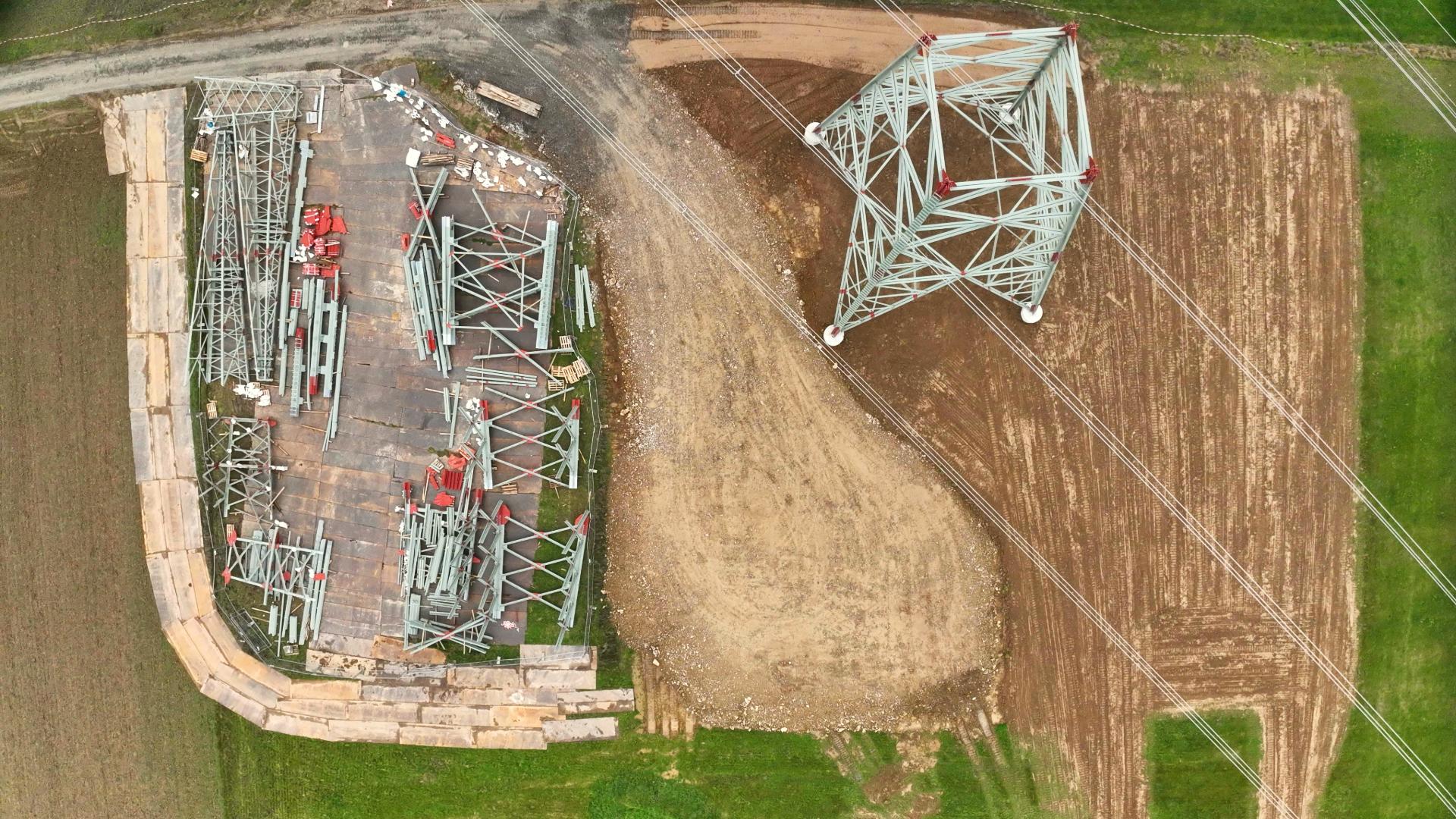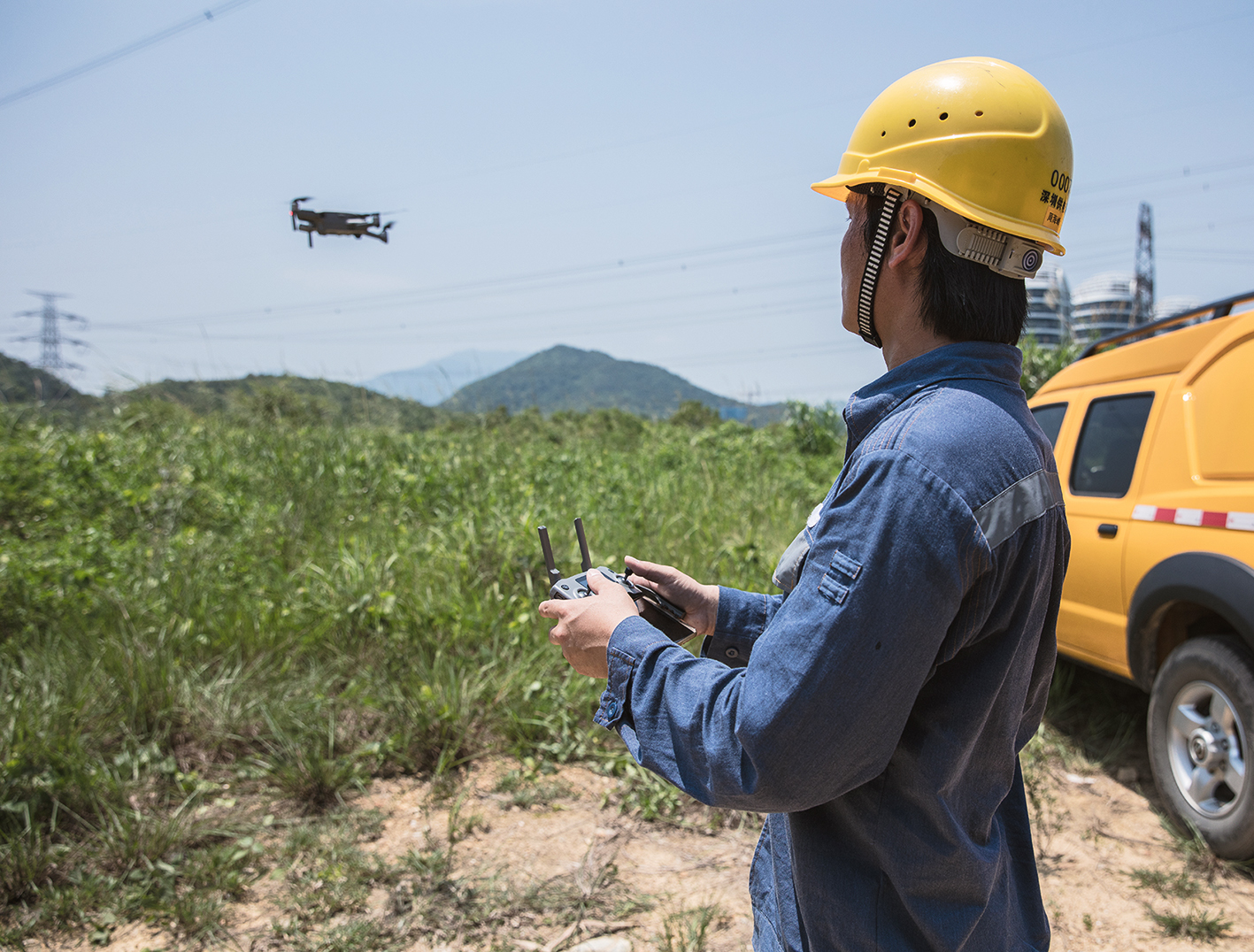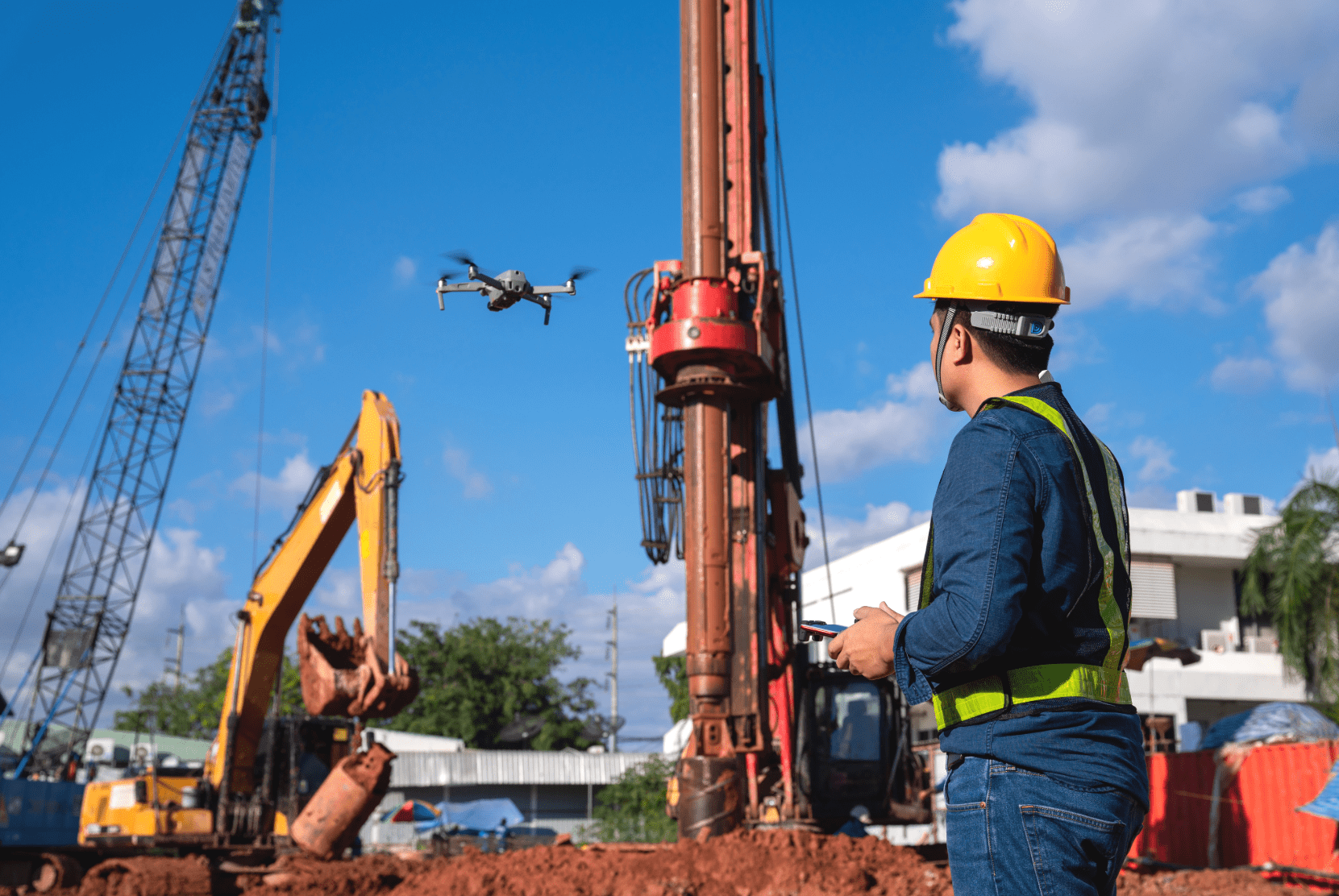Heute erweitern wir unsere Blogserie zu den Änderungen aus der neuen EU-Drohnenverordnung. Für den dritten Teil der Serie beschäftigen wir uns mit den Kenntnisnachweisen und erforderlichen Qualifikationen, die Piloten in Zukunft vorweisen müssen, um Drohnen zu fliegen. Hier finden Sie die beiden bisherigen Artikel, Teil 1 zum Thema „UAV-Klassen“ und Teil 2 zum Thema „Betriebsklassen“.
Der EU-Kenntnisnachweis
Kategorie „OFFEN“ für A1 und A3
Wie in Teil 2 schon erklärt, wird in Zukunft zwischen unterschiedlichen Betriebsklassen unterschieden. Ab einem Startgewicht der Drohne von mehr als 250 g braucht man erstmalig einen Kenntnisnachweis. Für Drohnenpiloten gilt als erstes: Es muss ein Online-Lehrgang absolviert werden. Für die höheren Betriebskategorien muss auch erfolgreich eine Online-Theorieprüfung abgeschlossen werden. Die Prüfung wird in Zukunft von einer zuständigen Behörde oder von einer zertifizierten Stelle durchgeführt. Zertifizierte Stellen, z. B. Modellflug-Vereine oder Drohnenschulen, werden von den zuständigen Behörden des Mitgliedstaats, in dem der UAS-Betreiber registriert ist, anerkannt.
Was ist Inhalt der Prüfung?
Die Prüfung umfasst 40 Multiple-Choice-Fragen zu den Themen:
- Flugsicherheit
- Luftraumbeschränkungen
- Luftrecht
- menschliches Leistungsvermögen und dessen Grenzen
- Betriebsverfahren
- allgemeine Kenntnisse zu UAS
- Versicherung
- Luftsicherheit
Das EU-Fernpiloten-Zeugnis
Kategorie OFFEN A2 bzw. C2-Geräte
Das EU-Fernpiloten-Zeugnis, oder auch „der große EU-Drohnenführerschein“, baut auf dem EU-Kenntnisnachweis auf. Dieser muss absolviert werden, um das EU-Fernpiloten-Zeugnis zu erhalten.
Es muss ein praktisches Flug-Training absolviert werden. Das Training muss auf einem Gebiet durchgeführt werden, auf dem nach vernünftigem Ermessen des Piloten keine unbeteiligten Personen gefährdet werden können. Zudem muss das Gebiet einen horizontalen Mindestabstand von mindestens 150 m zu Wohn-, Gewerbe-, Industrie- oder Erholungsgebieten haben. Das praktische Flug-Training kann durch eine einfache schriftliche Erklärung abgeschlossen werden.
Zudem muss zusätzlich eine Theorieprüfung mit mindestens 30 Multiple-Choice-Fragen absolviert werden. Zu den Themen der Prüfung gehören:
- Meteorologie,
- UAS Flugleistung,
- technische und betriebliche Minderung von Risiken am Boden.
Das EU-Fernpiloten-Zeugnis ist ebenfalls 5 Jahre lang gültig.
Das LUC-Zeugnis
Betreiberzeugnis für Leicht-UAS
LUC steht für „Light unmanned aircraft operator certificate“. Diese erweiterte Betriebsgenehmigung ermöglicht es einem Drohnenbetreiber, den eigenen Betrieb zu genehmigen. Das gilt natürlich nur im Rahmen dessen, was in der jeweiligen LUC erlaubt ist.
Das LUC-Zeugnis kann NUR von juristischen Personen beantragt werden. Der Antrag auf Ausstellung eines LUC oder auf Änderung eines vorhandenen LUC ist bei der zuständigen Behörde einzureichen und muss alle folgenden Angaben enthalten:
- eine Beschreibung des Managementsystems des UAS-Betreibers, einschließlich seiner Organisationsstruktur und seines Sicherheitsmanagementsystems
- die Namen des verantwortlichen Personals des UAS-Betreibers, einschließlich der Namen der Personen, die für die Genehmigung des UAS-Betriebs zuständig sind
- eine Erklärung, dass alle der zuständigen Behörde übermittelten Unterlagen vom Antragsteller geprüft und als im Einklang mit den einschlägigen Anforderungen befunden wurden
Für Flüge in der Betriebskategorie SPEZIELL wird entweder eine Betriebsgenehmigung oder eine vorherige Erklärung benötigt. Wer ein LUC-Zeugnis besitzt, benötigt keine Erklärung und muss keine Betriebsgenehmigung besorgen. Der LUC-Inhaber hat im Rahmen der Genehmigungsbedingungen das Recht, seinen eigenen Betrieb zu genehmigen. Außerdem behält ein LUC für eine unbegrenzte Dauer seine Gültigkeit.
Was passiert mit dem nationalen Drohnenführerschein?
Es gilt eine Übergangsfrist bis zum 31.12.2021. Bis dahin ist es möglich Ihren alten „großen Drohnenführerschein“ in einen EU-Kompetenznachweis umschreiben zu lassen.
Außerdem gilt:
- UAS-Betreibern erteilte Genehmigungen, Zeugnisse über die Kompetenz von Fernpiloten und Erklärungen von UAS-Betreibern oder gleichwertige Dokumente, die auf der Grundlage nationaler Vorschriften ausgestellt wurden, bleiben bis 1. Juli 2021 gültig.
- Bis zum 1. Juli 2021 wandeln die Mitgliedstaaten ihre vorhandenen Zeugnisse über die Kompetenz von Fernpiloten sowie ihre Genehmigungen für UAS-Betreiber oder Erklärungen oder gleichwertige Dokumente um.
- Flugmodell-Vereine und -Vereinigungen dürfen den UAS-Betrieb entsprechend dem nationalen Recht ohne eine Genehmigung bis 1. Juli 2022 fortführen.
Bremen und Bremerhaven aufgepasst
Die Landesluftfahrtbehörde Bremen bietet bis zum 11.12.2020 die Möglichkeit eine Allgemeinerlaubnis zu beantragen. Mit Inkrafttreten der neuen EU-Drohnenverordnung werden keine Erlaubnisse nach nationalem Recht mehr ausgestellt. Es müssen dann also alle Prüfverfahren und Vorgaben erbracht werden.
Kenntnisnachweise, die bis zum 30.12.2020 ausgestellt wurden, behalten ihre Gültigkeit auch nach Inkrafttreten der EU-Drohnenverordnung bis zum 01.01.2022.
Beantragen Sie also noch bis zum 11.12.2020 ihre Allgemeinerlaubnis!
Noch viele Unklarheiten
Der Artikel wurde mit den Informationen verfasst, die aktuell vorliegen. Es mangelt in der EU-Drohnenverordnung derzeit immer noch an diversen Stellen an klaren Vorgaben und Antworten. Auch der Ablauf der Prüfungen ist noch nicht endgültig beschlossene Sache. Es ist noch nicht geklärt welche Stellen in Zukunft Drohnenpiloten prüfen dürfen, bzw. wie aktuelle Ausbildungseinrichtungen die Zertifizierung erhalten und was sie tun müssen, um zukünftig Prüfungen durchführen zu können. Derzeit fehlt es an konkreten Vorgaben des Luftfahrt-Bundesamtes.
Hierzu werden aber in den nächsten Wochen neue Informationen erwartet, die wir dann auch mit bekannt machen wollen.
Im nächsten Blogartikel beschäftigen wir uns mit dem Thema Registrierungen und geben Ihnen einen Zeitstrahl an die Hand, damit Sie den Überblick nicht verlieren!
Ihr FlyNex Team
Dieser Artikel ist Teil einer Serie über Neuerungen und Veränderungen durch die EU-Drohnenverordnung. Unter anderem erklären wir in den Artikeln bis Ende des Jahres, wie sich die neuen Betriebskategorien unterteilen, welche Anforderungen Drohnen und Piloten zu welchen Stichtagen erfüllen müssen und was sich im Luftraum für Unbemannte Fluggeräte ändert. Wir freuen uns über Feedback, Ergänzungen und Vorschläge, um allen Leserinnen und Lesern verständliche und aktuelle Informationen bereitzustellen.
Hier finden Sie weitere Blogartikel zum Thema EU-Drohnenverordnung






